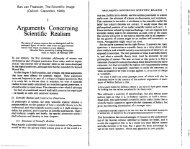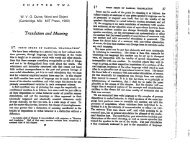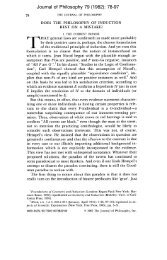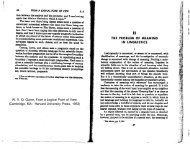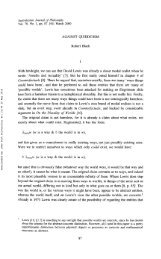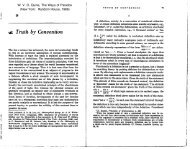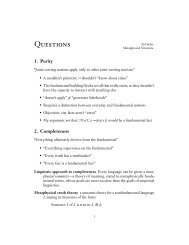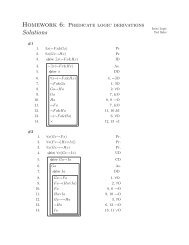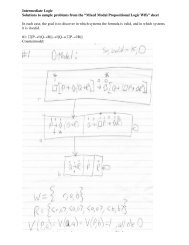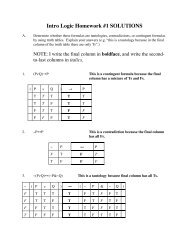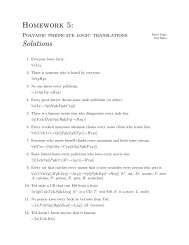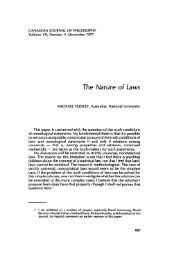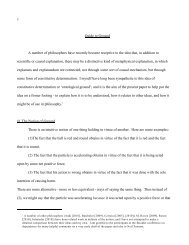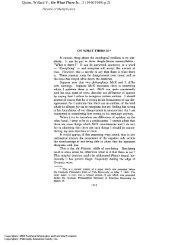Dummett - Wittgenstein's Philosophy of Mathematics.pdf - Ted Sider
Dummett - Wittgenstein's Philosophy of Mathematics.pdf - Ted Sider
Dummett - Wittgenstein's Philosophy of Mathematics.pdf - Ted Sider
You also want an ePaper? Increase the reach of your titles
YUMPU automatically turns print PDFs into web optimized ePapers that Google loves.
MICHAEL DUMMETT<br />
down the pro<strong>of</strong> with defined symbols; what, if anything, could<br />
be called the justification <strong>of</strong> "5 + 7 - I2" would be the pro<strong>of</strong><br />
that we actually do carry out that every addition sum "could"<br />
be formulated and proved within our formal logical system,<br />
and this pro<strong>of</strong> uses methods far more powerful than the rules<br />
for ordinary schoolroom addition.<br />
I now revert to the opposing pictures used by Platonists and<br />
constructivists-the picture <strong>of</strong> our making discoveries within an<br />
already existing mathematical reality and the picture <strong>of</strong> our<br />
constructing mathematics as we go along. Sometimes people<br />
-including intuitionists-argue as though it were a matter <strong>of</strong><br />
first deciding which <strong>of</strong> these pictures is correct and then drawing<br />
conclusions from this decision. But it is clear that these are only<br />
pictures, that is, that the dispute as to which is correct must<br />
find its substance elsewhere-that such a dispute ought to be<br />
capable <strong>of</strong> being expressed without reference to these pictures.<br />
On the other hand, such pictures have an enormous influence<br />
over us, and the desire to be able to form an appropriate picture is<br />
almost irresistible. If one does not believe in the objectivity <strong>of</strong><br />
mathematical truth, one cannot accept the Platonist picture.<br />
<strong>Wittgenstein's</strong> main reason for denying the objectivity <strong>of</strong> mathe-<br />
matical truth is his denial <strong>of</strong> the objectivity <strong>of</strong> pro<strong>of</strong> in mathe-<br />
matics, his idea that a pro<strong>of</strong> does not compel acceptance; and<br />
what fits this conception is obviously the picture <strong>of</strong> our construct-<br />
ing mathematics as we go along. Now suppose that someone<br />
disagrees with Wittgenstein over this and holds that a good pro<strong>of</strong><br />
is precisely one which imposes itself upon us, not only in the<br />
sense that once we have accepted the pro<strong>of</strong> we use rejection <strong>of</strong><br />
it as a criterion for not having understood the terms in which<br />
it is expressed, but in the sense that it can be put in such a form<br />
that no one could reject it without saying something which would<br />
have been recognized before the pro<strong>of</strong> was given as going back<br />
on what he had previously agreed to. Is such a person bound<br />
to adopt the Platonist picture <strong>of</strong> mathematics? Clearly not; he<br />
can accept the objectivity <strong>of</strong> mathematical pro<strong>of</strong> without having<br />
to believe also in the objectivity <strong>of</strong> mathematical truth. The<br />
intuitionists, for example, usually speak as though they believed<br />
in the former without believing in the latter. It is true that<br />
346



